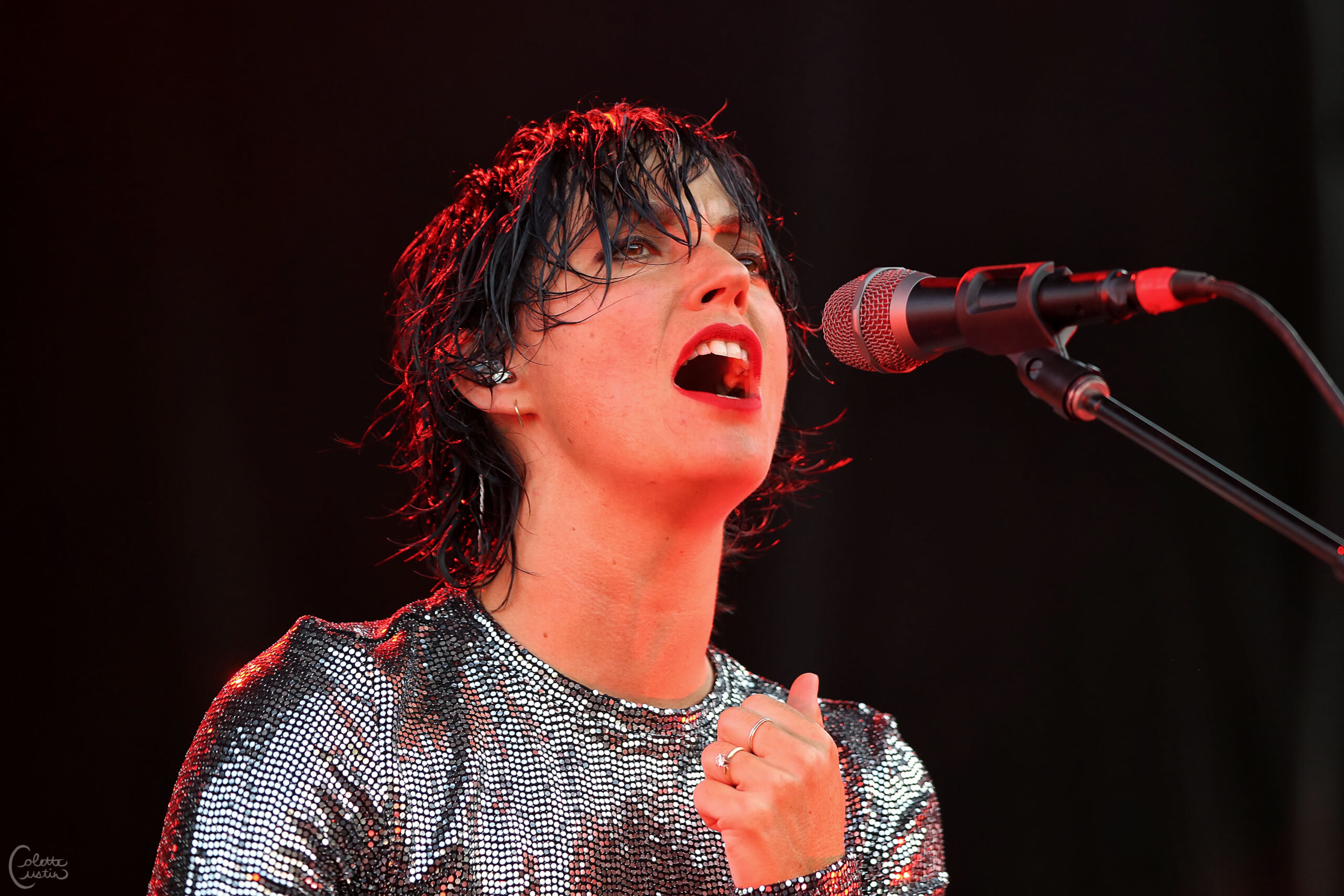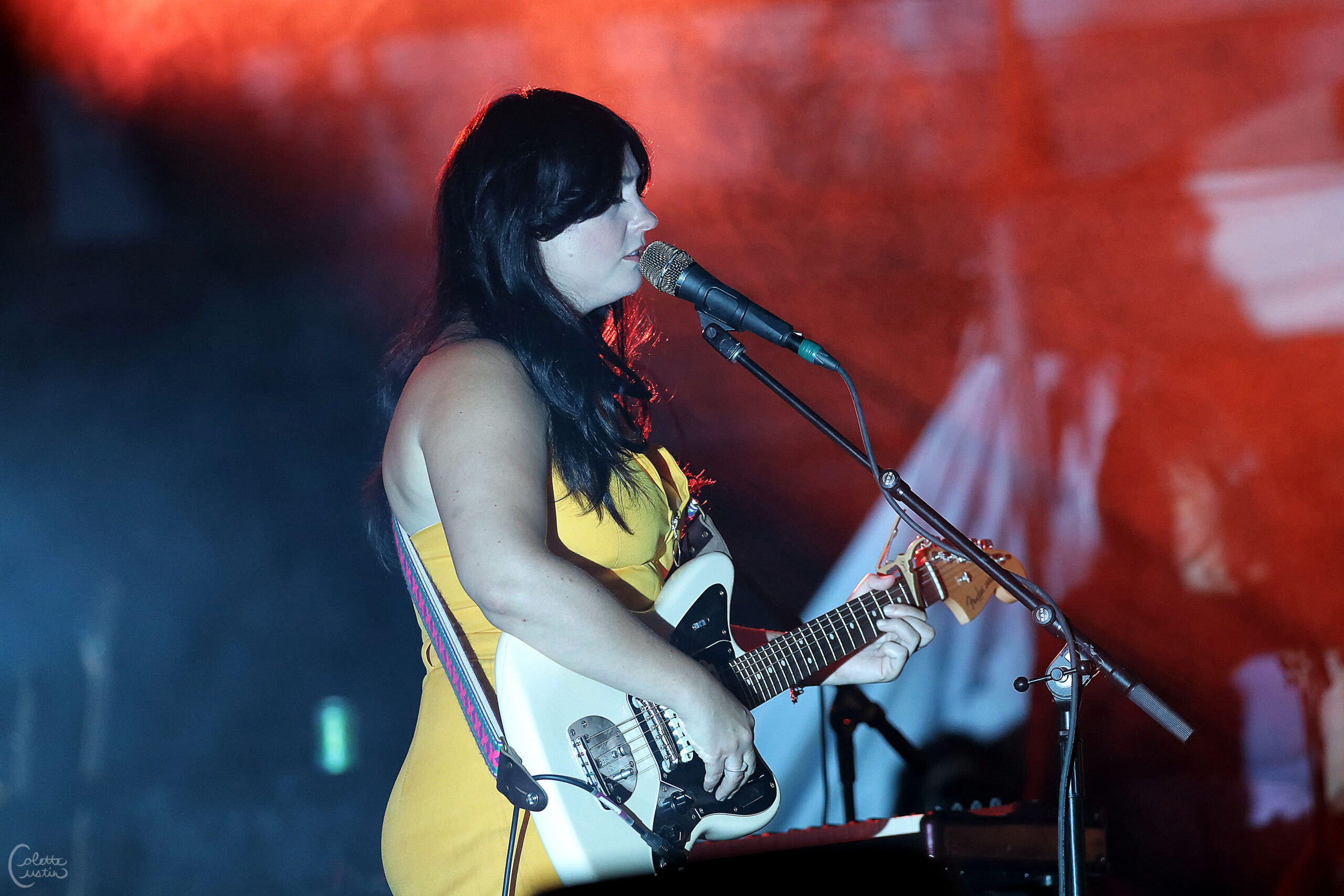Quinn Christopherson, Julien Baker, Sharon Van Etten, and Angel Olsen at The Salt Shed, 8/10/22
Besides a near-fatal collision between two bicyclists and
claims of a broken femur just outside the front gate, the third show to kick
off at the newest venue in Chicago began without a hitch. It was only 5:30 and
the bumper-to-bumper rush hour parked on the Kennedy Expressway was close
enough to turn off their radios and listen in. They were in luck, because ahead
of his full-length debut, Quinn Christopherson was capitalizing on an audience
full of Tumblr and IPA enthusiasts who provided a sizeable energy and who will
surely be clamoring for a physical release once September 16th rolls
around.
It was a brief set, but one that made an impression, and not
only for the manufactured importance of being one of the first artists on this
particular stage. In reality that importance, at least from Christopherson’s
end, should have come from the small handful of musicians who predated him; Makaya
McCraven, Nubya Garcia, Fleet Foxes and Sons of Kemet. Word had gotten out that
The Salt Shed, a reclaimed salt facility that laid vacant on the cities’ north
side had been reclaimed as one of a series of new developments along the
riverfront. In fact, much like the ease dropping series of cars to the venue’s
west, a small collection of boats had gathered in the river to the east, justifying
countless promoters and the idea that the north branch could become more than
just an industrial park.
Unfortunately, Julien Baker, the middle child of this double-headlining,
four act tour, was lost in the mix. Plenty of her fans were creeping in even
during Christopherson’s set, and just as many seemed to disperse once her set
was over, although that could owe less to a singular allegiance, as to a
frustration with how she sounded amidst the new venue’s PA. For much of her
set, tracks sounded muddled and tame, but Baker, either through her own
awareness, or a necessary professionalism, attempted to keep the crowd
interested through sheer energy. It wasn’t until closer “Ziptie” though, that
Baker, leaning into a cathartic and powerful conclusion, found a way to express
her seething anger to the audience. As she scuttered off the stage, she offered
only a limp wave to the crowd, and her frustration was evident.
By the time Van Etten took the stage, it seemed that most of
the technical kinks had been ironed out, and the muddy dirge of “Headspace”, a
track more muted than most openers was sufficient in its operatic instigation.
Olsen and Van Etten have been switching their order back and forth throughout
the tour, and although they both are adept to hold the crowd as a headliner, it
seemed that Olsen’s newer take on cosmic country would have done better during
the daylight than Van Etten’s darker and more punctuated drum machines.
Nevertheless, Remind Me Tomorrow tracks, “Comeback Kid” and “Seventeen”
were explosive and anthemic, proving that even though she had moved towards a
bigger, more stadium-ready sound, she still dripped with the pathos and
nostalgia that made Are We There and Tramp such career-defining
albums.
At one point, a mixing issue, caused Van Etten to perform,
“Hands”, a track whose album version, relies heavily on sputtering and
colliding synths to add a claustrophobic dread, as a solo acoustic number. It
worked, and as if it were a flex, she followed it with the normally regal,
“Every Time the Sun Comes Up”, transposed into an up-tempo 80s mix complete
with a busy synth guitar lead. Van Etten has proven that she can create just as
compelling music in the pop realm, and before launching into “Mistakes” she
encouraged the crowd to dance, justifying it with her own inability to do the
same. Instrumentless and dressed in a long sleeve sequin shirt, Van Etten
pranced around the stage and demonstrated parts of the Charleston for an ecstatic
audience. The only thing missing was a microphone headset.
After a short break, and as the sun began to go down, Angel
Olsen, clad in a yellow jumpsuit, emerged from behind a curtain. By now it was
8:30 and a sizeable portion of the crowd had been enduring the heat since their
workday had ended. Olsen’s “Dream Thing” however, worked as a necessary
respite, with Olsen stretching her vocals and kicking off a string of her new Big
Time tracks. These songs with their often-jaunty arrangements, pedal- steel
guitar and big choruses sounded bright and airy compared to the relatively
dark, emotion-driven sets that came before her.
Olsen spoke at length about the six years she lived in
Chicago, name checking her love for Logan Square landmarks, Miko’s Italian Ice
and the Chicago Diner, and detailing a new song she had been working on that
the band was going to attempt to play for the first time. As a joke, her and
the band then launched into “Shut Up Kiss Me” and in an ironic twist, Olsen’s
lead guitar was mixed low enough to make it sound as though the band really
hadn’t performed it before. Luckily, “Lark” and “Chance”, two of the highlights
from Olsen’s best album so far, All Mirrors, sounded immense and made
for a gripping end to her set.
As many had expected though, Olsen wasn’t finished, and when
returning for the encore she invited Van Etten up to the stage to perform their
fan-favorite duet, “Like I Used To”. Much like when the duo debuted the track
at Pitchfork Music Festival in 2021, the crowd was ecstatic. The two had
essentially spun that one-off collaboration into an entire tour and the chemistry
was palpable. It made for a fitting ending to the day, but instead of leaving
the stage as might be expected, the two treated the audience to a cover of
Harry Nilsson’s “Without You”, the kind of heart on your sleeve devotional that
sat perfectly amongst the string of emotionally-clad performances that preceded
it.


Comments
Post a Comment